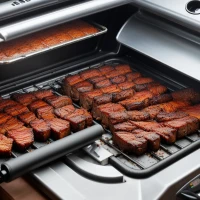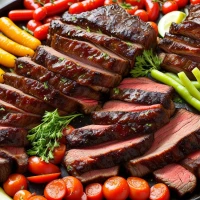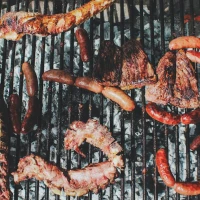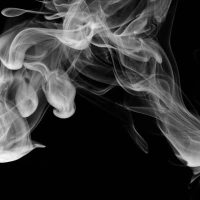Unlock the secret to preparing a perfectly smoked brisket using an electric smoker by following this ultimate guide. Whether you’re a barbecue aficionado or a novice home cook, understanding the nuances of electric smokers will elevate your smoking game. Brisket, with its rich, beefy flavor and potential for succulent tenderness, is the crowning jewel of barbecue meats. Smoking brisket in an electric smoker combines modern convenience with traditional smoking techniques to achieve that coveted smoky perfection.
Embracing the versatility of vegetables in electric smokers, this guide also ventures into how you can enhance your smoked brisket with complementary smoked vegetables, rounding out the meal with a symphony of flavors. Let’s dive into the intricate process of smoking brisket to perfection while intertwining the use of vegetables to create a well-balanced and deliciously smoked feast.
The Art of Smoking Brisket in an Electric Smoker
Smoking brisket is more than just a cooking method; it’s an art form that requires patience, precision, and passion. When using an electric smoker, you have the benefit of easily maintaining consistent temperatures, which is crucial for achieving the right tenderness and flavor in your smoked brisket.
Choosing the Right Brisket
When attempting to perfect the art of smoking brisket, you’ll first need to select the right cut of meat. Look smoke eater for home a brisket with even marbling and a good fat cap on top—this will ensure a moist and flavorful result. A whole packer brisket, which includes both the flat and the point, is preferable for smoking as it provides a balance of lean and fatty meat.
Preparing Your Brisket for the Electric Smoker
Prior to smoking, there are essential steps you must take to prepare your brisket. A well-prepared brisket will absorb the smoky flavors more effectively and develop an enticing bark.
- Trimming the Brisket: Remove excess fat, leaving about a quarter inch to ensure moisture and flavor.
- Seasoning: Use a simple rub of salt, black pepper, and garlic powder, or create your own custom seasoning blend.
- Marinating: For deeper flavor penetration, consider marinating your brisket for several hours or overnight.
Setting Up the Electric Smoker
- Preheating: Bring your electric smoker to the ideal smoking temperature, which generally ranges between 225°F and 250°F (107°C to 121°C).
- Wood Choices: Select wood chips that complement beef, such as hickory, mesquite, or oak, for a robust smoky flavor.
- Water Pan: Adding a water pan to the smoker can help maintain humidity, which is essential for preventing the brisket from drying out.
Smoking Process
- Initial Smoking Phase: Place the brisket in the smoker fat side up, and smoke until it reaches an internal temperature of 160°F to 170°F (71°C to 77°C).
- The Stall: Understand that brisket may experience a temperature stall, where it seems stuck at a certain temperature. Remain patient and avoid the temptation to raise the heat.
- Wrapping the Brisket: Once through the stall, you may wrap the brisket in butcher paper or aluminum foil to retain moisture and slightly speed up the cooking process.
- Final Smoking Phase: Continue smoking until the internal temperature reaches 200°F to 205°F (93°C to 96°C), the ideal range for tender brisket.
Crafting the Perfect Vegetable Companions
Smoked vegetables can be the ideal accompaniment to your brisket, as they soak up the smoky flavors while offering a nutritious balance to your meal. The magic of smoked vegetables lies in the simplicity of preparation and the depth of flavor they acquire from the smoking process.
Selecting Vegetables for Smoking
Some vegetables are particularly well-suited for smoking, as they possess the structural integrity to withstand the smoking process and have flavors that are enhanced by smoke 10 lb brisket at 225.
- Robust Vegetables: Potatoes, carrots, bell peppers, and onions.
- Infused with Smoke: Asparagus, zucchini, and tomatoes.
Preparing Vegetables for the Smoker
- Uniformity: Chop vegetables into uniform sizes for even cooking.
- Seasoning: Toss the vegetables with olive oil and a simple seasoning mix of salt, pepper, and aromatic herbs.
- Smoking Baskets: Use smoking baskets or foil packets to contain the vegetables and make them easier to manage in the smoker.
Smoking Vegetables: Timing and Temperature
- Temperature: Most vegetables are best smoked at temperatures between 225°F and 250°F (107°C to 121°C), which coincides with the brisket smoking temperature.
- Timing: Depending on the type and size of the vegetable, smoking can take anywhere from 30 minutes for smaller, tender vegetables to over an hour for denser varieties.
The Marriage of Flavors: Pairing Brisket with Smoked Vegetables
Consider the flavor profile of your brisket when selecting vegetables. For a spicy and bold rub, choose vegetables that can stand up to strong flavors, such as sweet potatoes or corn. For a milder brisket, smoked asparagus or bell peppers may complement the meat without overpowering it.
Tips for Perfect Vegetables
- Pre-Smoking: For denser vegetables like potatoes or carrots, you can pre-cook them slightly before smoking for more tender results.
- Placement: Place vegetables above the brisket in the smoker to let the meat juices baste them, adding umami and richness.
Achieving the Perfect Finish: Resting and Serving
The final steps are critical to ensuring your smoked brisket and vegetables reach their peak in terms of flavor and texture. Allowing the brisket to rest before slicing is key for the meat to reabsorb juices and become even more succulent.
Resting the Brisket
The brisket should rest for a minimum of 30 minutes up to several hours after reaching the desired internal temperature. Wrap it in butcher paper or a towel and place it in a cooler or a turned-off oven to keep it warm.
Slicing the Brisket
Slicing against the grain is crucial; it shortens the muscle fibers, tenderizing each slice. Use a sharp knife and take care to slice cleanly for the best presentation.
Serving Suggestions
- Placing the Items: Serve sliced brisket alongside a colorful array of smoked vegetables for an aesthetically pleasing and appetizing presentation.
- Sauces and Toppings: Offer barbecue sauce, pickles, and onions on the side for guests to customize their plates.
Tips for Leftovers
- Reheating: Reheat leftover brisket by steaming or in a covered dish in the oven to preserve moisture.
- Repurposing Vegetables: Smoked vegetables can be repurposed into salads, stews, or purees.
Conclusion: The Joy of Smoked Brisket and Vegetables
The patience and care invested in smoking brisket and vegetables in an electric smoker pay off with a meal that is both deeply satisfying and incredibly flavorful. By mastering the art of electric smoker use and selecting the right pairings, you can create a culinary experience that lingers in the memory of your guests long after the last slice has been savored.
Join the community of electric smoker enthusiasts and tackle your next smoking session with confidence, elevating your brisket and vegetables to smoky perfection.










